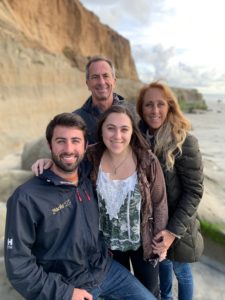This guest post is written by Cynthia Zorn, a Family Support Ministry advisor to our Family Partners.
 Our Story
Our Story
“I love my life,” were the last sweet words my daughter would whisper to me each night as she slowly fell into a restful slumber. During the nightmarish years to come, I longed to hear those words again.
As our daughter’s sleep ritual changed from night to day, day to night, her wakeful hours became less and less while nights were longer and longer. We struggled to get answers for our nine-year old daughter who could barely walk at times due to sleep deprivation. She would struggle to appear normal at the numerous doctor appointments and blood draws. Eventually, her symptoms became so severe that she was confined to a wheelchair. The dreaded doctor appointments that typically ended with the same answer, “Normal.”
Normalcy was far from what our family had been experiencing for a year. Doctors grasped at hints as to what could be the problem, but did not find anything. As a mom who had homeschooled my studious, athletic, outgoing and funny child, my heart and intellect told me otherwise.
I continued to search for answers. With more research, I found her symptoms described perfectly, “sleeping, laughing and falling.” The diagnosis was Narcolepsy with Cataplexy.
I was in disbelief. Narcolepsy with Cataplexy is a lifelong neurological disorder. “Please God,” I prayed, “No!” Which was worse? To have this answer or to have no answer?
Stanford Sleep Center was where we met Mackenzie’s new sleep specialist and neurologist, Dr. Mignot, along with his friendly little black dog, Bear, who also had narcolepsy with cataplexy. Dr. Mignot explained to our family that Mackenzie indeed had a rare neurological sleep disorder that does not have a cure. Experts suspect that narcolepsy is an autoimmune disease that is triggered by either the flu or head injury. Both had occurred within the year to our young daughter. Several sleep studies soon followed along with a blood test for the marker, and the diagnosis was confirmed.
What I Would Tell A Parent Looking for Answers When Something Is Not Quite Right
- You as the parent know your child better than anyone and will notice changes that no one else sees. Keep a log or journal of these changes. These may include a change in sleep patterns, depression, isolation, aggression, moodiness, changes in educational development, memory issues, changes in weight or changes in coordination.
- Be your child’s advocate by seeking pediatric professional advice. If you are not satisfied with the answer and the problem still persists, seek a second opinion or a different type of medical professional.
- Do your own research. Be prepared to back up any research suggestions to the doctors with facts.
Parenting Your Child
- Maintain a daily schedule for school, medications and sleep.
- Maintain a home environment as normal as possible.
- Continue or start serving, with your child, others in the community
- Never lay blame or guilt on the child or other family members.
- Ask the child what you can provide for them to help them be successful.
- Be patient with your child.
- Find ways to have fun.
- Advocacy Does Not End with Receiving a Proper Diagnosis.
- Start with a school counselor to advocate for school accommodations (504, IEP).
- Advocate with coaches, pastors, friends and family for events and activities that may require special attention for medication, activities and rest.
- Siblings and extended family need to be coached in how to support.
- Work as a team with your spouse to address the mental, emotional, physical, spiritual and educational areas. You may need to redefine some roles.
- Pay attention to sibling/s needs. Your child’s diagnosis impacts them, too.
- Provide a schedule and structure for the day.
- Set short- and long-term goals for the future.
- Discuss with your child what he or she would like for you to explain to the teacher, coach, family members and friends.
- Find the things your child can do well and focus on those things.
- Explore new interests with your child that they can participate in.
- Always be supportive. Focus on “trying.”
Prayer has been the key to our peace and patience in this circumstance. Our lives are filled with thanksgiving daily. The knowledge that God is with us and not against us in our efforts to raise a child who God created, and for whom he has a plan is at the forefront of our minds. As we have watched her grow in the strength of the Lord into an independent young Christian woman, we are amazed at the lives she has touched and will continue to touch as she works toward her dream to serve others in the medical field.
As my daughter likes to recite, “Life begins outside your comfort zone.”
Sweet dreams Mackenzie.
Resources: narcolepsynetwork.com

